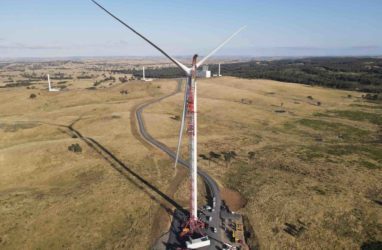Feed aggregator
Invasive yellow-legged hornet found in US for first time
The Asia native was found in Georgia, prompting concern that it could devastate important pollinators including the honeybee
A yellow-legged hornet has been found in the US for the first time, prompting concerns among experts about the agricultural threat the invasive Asian species poses, not least to honeybees and other pollinators.
The Georgia department of agriculture (GDA) said a beekeeper in Savannah spotted the insect on his property and reported it to authorities. It was subsequently confirmed as a yellow-legged hornet.
Continue reading...Green fertiliser company eyes future carbon credit sales via its South American project
EU greenhouse gas output fell nearly 3% in Q1, with ETS-covered sectors diverging in their rate of decrease
ANALYSIS: Hedging offers EUAs near-term support but weak demand signals to keep price pressure on
Five species face immediate concern of extinction, scientific committee warns Labor
Further 41 species on course to be declared critically endangered, complicating Albanese government’s zero extinctions target
Five species, including Tasmania’s Maugean skate, could jeopardise the Albanese government’s zero extinctions target, according to a scientific committee that provides advice on endangered species.
A further 41 species are on course to be declared critically endangered, sparking alarm from environment groups at the pace at which plants and animals are reaching the most urgent status on the threatened list.
Sign up for Guardian Australia’s free morning and afternoon email newsletters for your daily news roundup
Continue reading...Non-native grass species blamed for ferocity of Hawaii wildfires
Failure to heed warnings over unchecked growth meant blaze was ‘a disaster waiting to happen’, say scientists and academics
Scientists and academics say they have been warning for several years that invasive grasses covering a quarter of the Hawaii islands are a major fire risk.
Untamed grassland helped fuel the spread and intensity of last week’s deadly fires on the island of Maui, according to experts. The fires, which broke out last Tuesday, have killed at least 106 people and destroyed the island’s historic town of Lahaina.
Continue reading...State government order sparks concerns India’s new forestry act will bring deforestation, despite U-turn
Euro Markets: Midday Update
UK backs AI for industrial decarbonisation with funding for innovation and R&D
Oil, gas, coal companies’ production, carbon output not in line with Paris targets -study
ANALYSIS: One year in, the US IRA climate law has triggered a global green industry race
Extreme water stress faced by countries home to quarter of world population
Twenty-five countries are using 80% of their water supplies each year, research shows
Twenty-five countries that are home to a quarter of the world’s population are facing extreme water stress, according to research.
Data from the World Resources Institute suggests these countries are regularly using 80% of their water supplies each year.
Continue reading...NZ parliament debating industrial allocation, ETS late payment penalty legislation
Giant old trees are still being logged in Tasmanian forests. We must find ways of better protecting them
Oil giant joins startup to drive down green hydrogen costs
Energy Insiders Podcast: Wind, solar and social licence
 Behavioural scientist John Pickering on the challenges of getting social licence for wind, solar, battery and transmission projects. Plus: What’s big coal up to?
Behavioural scientist John Pickering on the challenges of getting social licence for wind, solar, battery and transmission projects. Plus: What’s big coal up to?
The post Energy Insiders Podcast: Wind, solar and social licence appeared first on RenewEconomy.
Fears of further delays on renewable zones as EnergyCo under review by NSW
 Renewable energy industry fears role of EnergyCo under review as NSW assesses a key report on the health of its energy market.
Renewable energy industry fears role of EnergyCo under review as NSW assesses a key report on the health of its energy market.
The post Fears of further delays on renewable zones as EnergyCo under review by NSW appeared first on RenewEconomy.
Chelion Australia’s all-in-one battery cabinet for renewable energy deployment
 Chelion Australia are excited to announce that the integrated components of the Matrix CAIO All-In- One Battery Cabinet have been granted Clean Energy Council (CEC) approval for sale in Australia.
Chelion Australia are excited to announce that the integrated components of the Matrix CAIO All-In- One Battery Cabinet have been granted Clean Energy Council (CEC) approval for sale in Australia.
The post Chelion Australia’s all-in-one battery cabinet for renewable energy deployment appeared first on RenewEconomy.
Montana kids win historic climate lawsuit – here’s why it could set a powerful precedent
 The lawsuit is the first in US to rely on a state’s constitutional right to a clean and healthful environment to challenge policies that fuel climate change. It won’t be the last.
The lawsuit is the first in US to rely on a state’s constitutional right to a clean and healthful environment to challenge policies that fuel climate change. It won’t be the last.
The post Montana kids win historic climate lawsuit – here’s why it could set a powerful precedent appeared first on RenewEconomy.
All carrot, no stick: What Australia can learn from US approach to renewables
 On the one-year anniversary of the US IRA, we look at the top five impacts, and how Australia can follow suit.
On the one-year anniversary of the US IRA, we look at the top five impacts, and how Australia can follow suit.
The post All carrot, no stick: What Australia can learn from US approach to renewables appeared first on RenewEconomy.



